ALL THE WRONG MOVES
The musical Chess highlights the tongue-twisting, swift, and pithy lyrics by Tim Rice and the soaring, dazzling music by Benny Andersson and Björn Ulvaeus of ABBA fame. In previous Stage and Cinema reviews of productions at MTG and the Met Theatre, its history has been well-documented: The super-partnership of Rice-Andersson-Ulvaeus in 1979; the worldwide success of Chess’ 1984 concept album; its shaky 1986 mounting in London, and a bungled 1989 Broadway production. Since then it has lived in a bubble of enormous potential, but has yet to burst forth 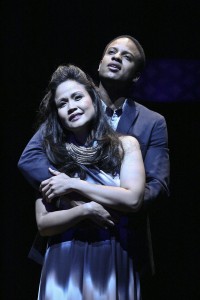 as a great musical in spite of numerous tweaks and reworked books (even Tim Rice, who supervised the version at Albert Hall in 2008, saw that it was best done as a concert). The reason why the show is so often produced resides with the score, one of the best ever written for a recording studio.
as a great musical in spite of numerous tweaks and reworked books (even Tim Rice, who supervised the version at Albert Hall in 2008, saw that it was best done as a concert). The reason why the show is so often produced resides with the score, one of the best ever written for a recording studio.
For the time being, the key to making this work exciting and affecting in a staged performance is to showcase the score and curb the complicating and confusing story elements. East West Players tackles Chess with the still bizarre and befuddling original UK book (with additional material from the Broadway and the Rice concert versions), but this production suffers from much more than an oddly constructed libretto (which, it seems, cannot be avoided). This checkered outing includes the following: Miscast actors who were clearly utilized for purposes of multiculturalism, not because they are right for the roles (one of the reasons for the mediocre performances); director Tim Dang’s atrocious staging; and a band overwhelmed by the complex, shape-shifting music. I can only wonder what sort of involvement and thought process Dang had to take a flawed ruby and deliver rubbish instead of refinement.
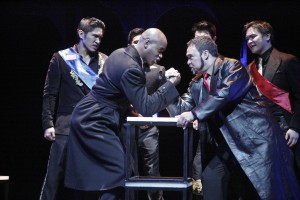 The metaphor of chess itself – war, strategy, etc. – is woven through a tale involving politics, romance, and matters of personal honor. The story takes place in the later years of the US / USSR cold war conflict and centers the action on the World Chess Championship showdown between two brilliant players: Freddie, a brash, upstart American who is the current World Champion, and Anatoly, a cool, collected Soviet challenger. Both their fates are transformed not by country or by game, but by Florence, Freddie’s manager, lover, and second. In an attempt to sort out some tempers at a match in Merano, Italy, Florence starts to fall in love with Anatoly. Love triangles and political intrigue emerge and surprising personal truths are revealed as another match is played in Bangkok in the equally clunky second act. However, nothing is clunkier than the manner in which it is presented at the David Henry Hwang Theatre.
The metaphor of chess itself – war, strategy, etc. – is woven through a tale involving politics, romance, and matters of personal honor. The story takes place in the later years of the US / USSR cold war conflict and centers the action on the World Chess Championship showdown between two brilliant players: Freddie, a brash, upstart American who is the current World Champion, and Anatoly, a cool, collected Soviet challenger. Both their fates are transformed not by country or by game, but by Florence, Freddie’s manager, lover, and second. In an attempt to sort out some tempers at a match in Merano, Italy, Florence starts to fall in love with Anatoly. Love triangles and political intrigue emerge and surprising personal truths are revealed as another match is played in Bangkok in the equally clunky second act. However, nothing is clunkier than the manner in which it is presented at the David Henry Hwang Theatre.
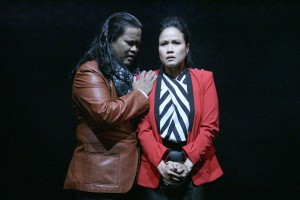 To start, the mismatched performers, who have little to no chemistry. Elijah Rock has the incredible vocal range, control, and power necessary to knock Anatoly’s challenging songs out of the theater. Not so with his range as an actor: He’s supposed to be the romantic hero we’re rooting for, and instead we are subjected to a wooden performance where beautiful ballads and impassioned anthems are reduced to nothing more than mere exercises of vocal prowess. Whereas Rock has the voice coupled with blank interpretation, Victor E. Chan, as Freddie, overcompensates for his rival’s stale nature by over-gesticulating and overwrought vaudevillian emphasizing, and his vocal range, while impressive, is not altogether consistent. Joan Almedilla sings quite well as Florence and does the best she can to make the scenes work with the extreme performances of her co-actors. Carey Rebecca Brown comes as a breath of fresh air in the underwritten role of Anatoly’s wife, Svetlana, and beautifully sings and interprets “Heaven Help My Heart.”
To start, the mismatched performers, who have little to no chemistry. Elijah Rock has the incredible vocal range, control, and power necessary to knock Anatoly’s challenging songs out of the theater. Not so with his range as an actor: He’s supposed to be the romantic hero we’re rooting for, and instead we are subjected to a wooden performance where beautiful ballads and impassioned anthems are reduced to nothing more than mere exercises of vocal prowess. Whereas Rock has the voice coupled with blank interpretation, Victor E. Chan, as Freddie, overcompensates for his rival’s stale nature by over-gesticulating and overwrought vaudevillian emphasizing, and his vocal range, while impressive, is not altogether consistent. Joan Almedilla sings quite well as Florence and does the best she can to make the scenes work with the extreme performances of her co-actors. Carey Rebecca Brown comes as a breath of fresh air in the underwritten role of Anatoly’s wife, Svetlana, and beautifully sings and interprets “Heaven Help My Heart.”
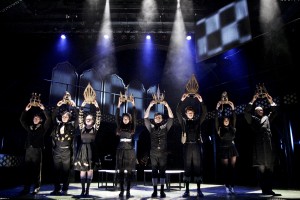 Ray A. Rochelle plays Molokov – Anatoly’s second and KGB agent – like Boris Badenov of Rocky and Bullwinkle fare, which he performs quite well, but it doesn’t translate effectively in this musical – he seems more comical than threatening. His baritone is impressive, and he comes close to stealing the show during “The Soviet Machine,” wherein he unleashes a series of balletic turns in stunning fashion (Rochelle’s thick Russian accent also calls into question why Rock’s Anatoly has none). Ryan Castellino plays the Arbiter – a referee and president of the International Chess Federation – with plenty of proper ham and cheese; while his voice is capable of hitting all the notes, his range is chopped between his chest voice and a distinctly nasal and helium-filled head voice; it is jarring to hear him go in and out in the middle of phrases.
Ray A. Rochelle plays Molokov – Anatoly’s second and KGB agent – like Boris Badenov of Rocky and Bullwinkle fare, which he performs quite well, but it doesn’t translate effectively in this musical – he seems more comical than threatening. His baritone is impressive, and he comes close to stealing the show during “The Soviet Machine,” wherein he unleashes a series of balletic turns in stunning fashion (Rochelle’s thick Russian accent also calls into question why Rock’s Anatoly has none). Ryan Castellino plays the Arbiter – a referee and president of the International Chess Federation – with plenty of proper ham and cheese; while his voice is capable of hitting all the notes, his range is chopped between his chest voice and a distinctly nasal and helium-filled head voice; it is jarring to hear him go in and out in the middle of phrases.
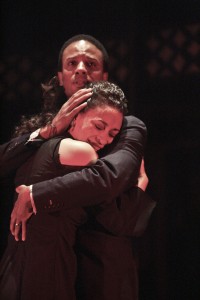 Dang’s vision of Chess introduces a character dubbed “The Spirit of Chess” (Jasmine Ejan) who dances around during the prologue and various chess matches. This creation neither illuminates the story nor makes it more coherent. On top of that, Marc Oka’s choreography lacked the fluidity one would expect from a spirit of any sort.
Dang’s vision of Chess introduces a character dubbed “The Spirit of Chess” (Jasmine Ejan) who dances around during the prologue and various chess matches. This creation neither illuminates the story nor makes it more coherent. On top of that, Marc Oka’s choreography lacked the fluidity one would expect from a spirit of any sort.
Music Director Marc Macalintal’s performers are overwhelmed by the demanding score, in which time changes and tonal shifts are frequent and unrelenting. The trimmed-down band of six struggles to keep up but too often falls behind. Complicating matters is Yoshi Irie’s tepid and irregular sound design – absolutely unforgivable for a piece with a bombastic and explosive score fueled by powerhouse voices and dynamite music. The chorus is both game and vocally strong, but melody lines and lyrics, while better understood than most productions of Chess, are often lost. The male ensemble really showed off the show’s potential with a rousing and riotous “Embassy Lament.”
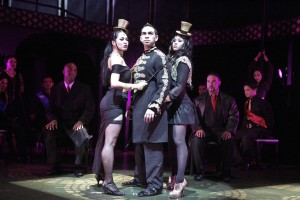 Anthony Tran’s mismatched costumes are positively indescribable in that dark Tim Burton / 1980s thrift store kind of way. Add to that Adam Flemming’s set and Dan Weingarten’s lights, and it looks like we’re in a seedy multi-level Bangkok gay bar from the start of Act One. The trappings are sufficient only for “One Night in Bangkok,” when the stage comes alive with scantily-clad dancing boys in tight gold lamé shorts and dominatrices in hats that were stolen from an organ grinder’s monkey. While the rest of Act Two can be forgiven the dark and dingy atmosphere of that disreputable city – it makes no sense why Merano, Italy looks the same but feels like a soviet-themed bar and lounge.
Anthony Tran’s mismatched costumes are positively indescribable in that dark Tim Burton / 1980s thrift store kind of way. Add to that Adam Flemming’s set and Dan Weingarten’s lights, and it looks like we’re in a seedy multi-level Bangkok gay bar from the start of Act One. The trappings are sufficient only for “One Night in Bangkok,” when the stage comes alive with scantily-clad dancing boys in tight gold lamé shorts and dominatrices in hats that were stolen from an organ grinder’s monkey. While the rest of Act Two can be forgiven the dark and dingy atmosphere of that disreputable city – it makes no sense why Merano, Italy looks the same but feels like a soviet-themed bar and lounge.
Flemming’s projection design is infuriating, with looped videos and a “LIVE TV feed” video camera stationed upstage left, leaving the characters to talk towards the camera and into the wings. Why are they looking there instead of out into the audience? And why is the blurry screen stationed at the top of the stage on stage left? Our eyes are forced to bounce back and forth unnaturally. As bad as this was, the worst staging had to be the final match; it took place stage right on a platform between the top of the scaffolding and the stage itself, while the spirit of chess was free to dance all around center stage. Even with all of the volume, one audience 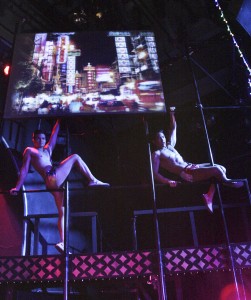 member seated to my left fell asleep; a few others left at intermission, no doubt due to the poor management of all these elements. I suspect that the only people who would sit through this ordeal are those who take pleasure in watching American Idol auditions.
member seated to my left fell asleep; a few others left at intermission, no doubt due to the poor management of all these elements. I suspect that the only people who would sit through this ordeal are those who take pleasure in watching American Idol auditions.
Chess is ultimately a musical about the value of our choices; the chess pieces of our life that we think are vital to success can quickly fly off the board in one swift move. It’s about adapting and making the moves necessary to go forward and make it in life. Some are by necessity, some are foolish, some require sacrifice, and hopefully we end up with the results we want in the end. The dream is that we can rise victorious from the incongruous belief systems we are born into. That’s why people see the potential of this musical as one which is both transformative and exceptional (and that is also why this burnt-out critic keeps returning to the theater after so much dreck — every show is a potential for transformation). Unfortunately at East West Players, Tim Dang makes all the wrong moves and puts both his performers and the audience in an undeserved checkmate.
photos by Michael Lamont
Chess
East West Players
David Henry Hwang Theater at the Union Center of the Arts
scheduled to end on June 23, 2013
for tickets, call 213.625.7000 or visit http://www.EastWestPlayers.org
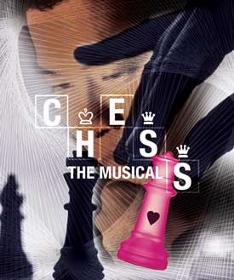

{ 5 comments… read them below or add one }
Mr. Corti, I don’t know when you saw the show but when I saw it Friday night, I thought it was one of the best presented full productions of Chess I had seen in a long time (and I’ve seen MANY). The cast is wonderful and the choices that were made were smart and only helped clarify the story. Although I respect your opinion on many things, I feel that your judgements on the two leading men were a little off base. Chan and Rock were great contrasts to each other. Rock’s cool, calculating portrayal of Anatoly was a great contrast to Chan’s brashness and general hot headedness of Freddie in Act 1. Then we see Chan show a more subdued Freddie in Act 2. I’m not sure why you were criticizing the lack of Russian accent from Rock. Saying a Russian speaking English needs to have a Russian accent strikes me as a little racist. Would you say that an Asian speaking English should have an Asian accent? Maybe you should think about those kinds of issues before making a judgement like that. But to quote Avenue Q, everyone’s a little bit racist.
Once again, I respect your opinions on this show and can see your points but I would have to disagree with you. I loved this production and the direction Dang took with it and will recommend this show to all of my friends. But of course, just like you, I’m just one man’s opinion.
Mr. Galarza:
When Mr. Corti mentioned that “Rochelle’s thick Russian accent also calls into question why Rock’s Anatoly has none,” he was clearly referring to the incongruity of the dialects. For you to pull out the “race card” seems just as incongruous to me. What if a Shakespeare rendering had British dialects but one actor did not? Is a critic racist against Elizabethans if he noticed that?
Mr. Frankel:
Funny you mention the “race card” seeing that I am hispanic and I used the asian example in honor of East West Players. Maybe that was racist in of itself on my part. I can certainly see the point you are making but I, personally, do not think the parallel you are making fits this situation. Shakespeare has all native English speakers and we were talking about two Russian characters speaking a foreign language. Personally, it would depend on the Shakespearean production on whether it would bother me if the dialects were incongruous (great word, by the way). For example, if, in Hamlet, Rosencrantz spoke with a Cockney accent and Guildenstern with no accent, I would question that choice. That being said, I wouldn’t mind if Hamlet adapted a non-colloquial accent to show the difference in station in life and possible education. Same with Rock and Rochelle’s choices. Once again, I can only express my personal opinions but the way I saw it was that Rock’s choice of no accent reflected his character’s level of education and his dedication to doing everything well. On the flip side of that, I thought Rochelle’s accent is due to the fact that his character learned English because he had to (“all for Mother Russia”). That’s what I took away from that. One man’s opinion. Of course, like I mentioned before, I’ve seen many productions and, perhaps, I’m “too close” to the fact that the book of this musical is troubled. I would have liked to have seen Anatoly speak a couple of phrases in Russian to Molokov, but it just wasn’t in the script (licensing issues, I’m sure). In fact, it would even make more sense if Anatoly also spoke a couple of phrases in Italian and/or German in the first act since it is set in Merano, Italy. Tim Rice, I have some rewrites for you…
Goodness, I didn’t mean for this to go on like that but, perhaps, you are right. Maybe I pulled out the “race card” too easily too soon. Maybe not.
Thank you for your opinion on this and showing me that, possibly, Mr. Corti just couldn’t wrap his head around two Russians, speaking English, having two different accents. Now, if Rock had spoken with a Southern accent, then I just couldn’t get on board with that…
Mr. Galarza:
I appreciate the fact that you took time out of your day to contribute a response to my review. It is unfortunate there is not more dialogue between reviewers and audience or even between the reviewers and the artists involved. I am grateful that you extended your point of view for me to consider, but I am offended by your attempt at character assassination by labeling me a racist. Here is a newsflash: I am Hispanic. However, merely defining one’s racial background does not absolve anyone from making prejudiced remarks or absolve one’s mediocre and underwhelming work.
I saw the show on that Friday night and stand by every word of my review. I highlighted the inherent errors of the piece courtesy of book writer (American) Richard Nelson. I care about truth, and I care about excellence. I do not concern myself with anything less than that.
What exactly was clarified that you found murky in other productions? And if it is not attached to the staging or the performers’ characterization–how do you attribute it to this production?
I took no issue with the contrast (the architecture of which is deeply woven in the fabric of the music and book) of the American and Russian characters–my issue was how that contrast was characterized and conveyed. The Russian wasn’t cool, he was wooden. The American wasn’t brash, he was hammy.
When the context of the piece and the context of the character are juxtaposed in a drama–eyebrows are expected to be raised. There are different rules for farce and satire, but that was not the fashion that this production of Chess was presented at East West Players.
For a Russian character growing up in post WWII Soviet Union…no matter how good his education is–he has been conditioned in the USSR fashion, making a non-accent jarring to the ears when coupled with his Second’s HEAVY Russian accent. It’s a matter of specificity and detail that lacked not only in defining his character, but unfortunately also permeated through the rest of his performance.
As for Hamlet and compatriots Rosencrantz, Guildenstern, and Horatio, they MIGHT sound different from the others because of their Wittenberg education–very different from the other Danes!
ANOTHER MAN’S OPINION
After reading the mean-spirited review by Mr. Conti, I was heartened to read the contrary opinion of another theatre-goer, namely Mr. Galarza. With such a dearth of good theatre in Los Angeles, I was delighted to witness the best production of CHESS that I have seen to date (including the original London production and the Australian production). Since I was seeing the East/West Players, I expected a multi-cultural cast but unlike Mr. Conti I felt that the production succeeded on its own merits and casting was certainly not constrained by that factor. I, like the entire cast (which included Sir Tim Rice at the performance I attended) rose to my feet along with the entire audience to give the whole cast a well deserved standing ovation. And for that performance it was not just one man’s opinion but also that of the complete audience. Bravo Mr. Dang!